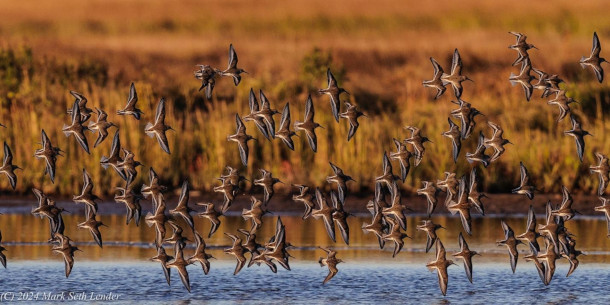"Countermeasures"- Dunlin
Air Date: Week of May 16, 2025

Dunlin asleep in the saltpans. (Photo: © Mark Seth Lender)
On the placid saltpans of Parker River National Wildlife Refuge in coastal Massachusetts, the shorebirds known as dunlin are feeding. Then, just like that, they rise and fly in almost perfect unison to evade an intruder, Living on Earth’s Explorer-in-Residence Mark Seth Lender reports.
Transcript
CURWOOD: After the break, we’ll hear about a shorebird success story. But first, here’s a moment Living on Earth’s Explorer-in-Residence Mark Seth Lender observed among different shorebirds last fall.
Countermeasures
Dunlin
Parker River National Wildlife Refuge
Newburyport, Massachusetts
© 2024 Mark Seth Lender
All Rights Reserved
LENDER: Dunlin have gathered for sleep. Out on the saltpans. More than a hundred. The crest of a great wave, South. They stand stilted on one foot, faces turned all the way round and tucked between shoulders, breathing in their own feathered warmth. The saltpans are shallow, the bottom muddy; one pops up with the effort of pulling free and pogo sticks to a different spot. Indicative of an edginess that ultimately makes them leave; a short flurry of takeoff and land, same thing.
At sunrise, beneath the long shadow of the sand dune they are already feeding. Like Singer sowing machines, the foot-peddle kind my grandmother owned. Industrious little grandmothers, that's what they look like, their stubby little beaks with that downdip at the end going, chakka-chakka, chakka-chakka, chakka-chakka chukka. Stitching for pennies, no time for rest.
And –
Whoofff!
The entire flock is airborne.
Turn Left! Turn right! Towards me now, the knife edge of their wings all in the vertical and all in line.
And TURN!
Wings blue-white in the dune’s blue-grey shadow.
TURN!
Wings red-gold as they rise into sunlight.
TURN!
Drop low wings kissing water.
TURN! TURN! And TURN…
Falcon.
That’s what put the dunlin up.

Dunlin cornering to evade the intruder. (Photo: © Mark Seth Lender)
One of the regulars thinks, merlin. Kestrel, merlin, peregrine even, the same for all of them, the half-illumination of early morning works to their advantage. Reduced, so the dunlin hope, by the paradox of confusion in synchronous flight.
As the sun clears the dune the flock breaks into clans and families, to settle in the tall marsh grasses where they continue to feed, hiding as much as they can from the all too revealing day. Until dusk. When they return to the saltpans, out in the open, waiting on the dark.
While across the marsh now a northern harrier glides, her eye catching the last radical of light, an ancient and indifferent star.
CURWOOD: That’s Living on Earth’s Explorer in Residence, Mark Seth Lender.
Links
Living on Earth wants to hear from you!
Living on Earth
62 Calef Highway, Suite 212
Lee, NH 03861
Telephone: 617-287-4121
E-mail: comments@loe.org
Newsletter [Click here]
Donate to Living on Earth!
Living on Earth is an independent media program and relies entirely on contributions from listeners and institutions supporting public service. Please donate now to preserve an independent environmental voice.
NewsletterLiving on Earth offers a weekly delivery of the show's rundown to your mailbox. Sign up for our newsletter today!
 Sailors For The Sea: Be the change you want to sea.
Sailors For The Sea: Be the change you want to sea.
 The Grantham Foundation for the Protection of the Environment: Committed to protecting and improving the health of the global environment.
The Grantham Foundation for the Protection of the Environment: Committed to protecting and improving the health of the global environment.
 Contribute to Living on Earth and receive, as our gift to you, an archival print of one of Mark Seth Lender's extraordinary wildlife photographs. Follow the link to see Mark's current collection of photographs.
Contribute to Living on Earth and receive, as our gift to you, an archival print of one of Mark Seth Lender's extraordinary wildlife photographs. Follow the link to see Mark's current collection of photographs.
 Buy a signed copy of Mark Seth Lender's book Smeagull the Seagull & support Living on Earth
Buy a signed copy of Mark Seth Lender's book Smeagull the Seagull & support Living on Earth

